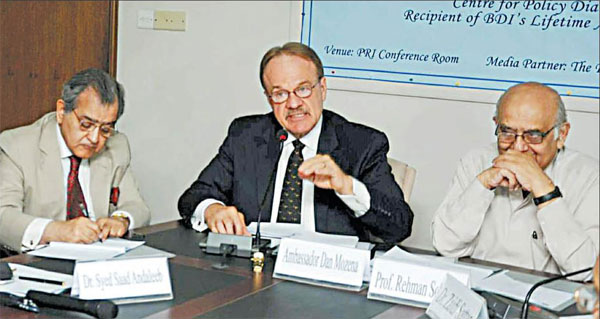
News published on 26 July 2013 in The Financial Express Photo: The Independent
BD may regain GSP by engaging with US action plan, compact : Mozena
FE Report
US Ambassador in Dhaka Dan W Mozena reiterated Thursday that Bangladesh could regain the Generalised System of Preferences (GSP) by engaging with the US GSP Action Plan and the compact involving the EU, the US, ILO and Bangladesh.
“I am already engaging with the government of Bangladesh on how best to proceed in addressing the points raised in the GSP Action Plan so Bangladesh can again qualify for GSP privileges,” he said while speaking at a discussion meeting.
The Policy Research Institute (PRI) and the Bangladesh Development Initiative (BDI) jointly organised the discussion on ‘A Get-together to Follow-up on the Harvard-Berkeley Conferences of 2008, 2009 and 2013’.
The follow-up discussion on the three BDI conferences-two on the Harvard University campus and one on the UC Barkeley campus-was intended to strengthen the bonding between the Bangladeshi diaspora in the USA and the development practitioners, business leaders and policymakers in Bangladesh.
Eminent economist Professor Rehman Sobhan, PRI Chairman Dr. Zaidi Sattar, BDI Executive Member Dr. Syed Saad Andaleeb and former Foreign Secretary Farooq Sobhan also spoke at the meeting.
In his welcome speech, Dr. Zaidi Sattar said the BDI conferences helped push the frontiers of research on Bangladesh economy and society by building bridges between the Bangladeshi US academia and the local scholars and development practitioners.
“The consequences are the mutual enrichment of knowledge and ideas. In other words, this partnership promises to turn the so-called ‘Brain Drain’ into ‘Brain Gain’,” he said.
US ambassador Mozena said the bottom line of all the initiatives is to pursue strong, dynamic and profitable RMG (ready-made garment) and knitwear sectors, where workers are fairly compensated and fairly treated and where working conditions are safe.
He said the Rana Plaza and Tazreen Fashions incidents are no accidents; they were the handiwork of greed and corruption, for which the issues of workers’ rights loom hugely in America’s relationship with Bangladesh.
“I believe these horrible incidents may prove to be the clarion call for deep, fundamental change of the apparel sector in Bangladesh, change that will address the serious labour rights and workplace safety issues,” he said.
The change will bring the apparel sector to the global standard and will make Bangladesh a preferred brand, not a pariah brand, in the global marketplace.
On July 8, the EU and the government of Bangladesh, in association with the International Labour Organisation, adopted a compact to ensure sustainability of the Bangladesh apparel sector through continuing improvements in labour rights and factory safety.
On July 19 America announced its association with the compact.
“We look forward to working as a full partner with the EU, Bangladesh, and the ILO to implement the goals of the Compact,” the ambassador said.
He said the US GSP Action Plan, a separate plan for Bangladesh, also requires the latter to take some additional concrete actions to protect labour activists and promote safe working conditions in the shrimp processing industry, apart from the RMG sector.
Dan W Mozena said despite some identified shortcomings, the amendments to the Bangladesh Labour Law facilitate workers’ rights to associate and organise and thus contribute to an environment.
Professor Rehman Sobhan suggested that the BDI should take steps to float a ‘Diaspora Bond’ to bring together capital and thus take part in development programmes in the country taking lessons from India and China.
“India floated the same kind of bonds and it helped a lot in their economy which Bangladesh can follow,” he said.
The eminent economist said most of the Bangladeshis in America are working people. So the financial products should be designed and marketed accordingly.
He urged them to take help from a large number of Bangladeshi Americans who work for banks and financial institutions.
He urged the BDI and the diaspora researchers to look at other countries including those under the African Growth and Opportunity Act (AGOA) to examine how the US deals with those countries in terms of GSP.
He also suggested the BDI to look into why the Bangladeshi exporters could not utilise the duty-free access to the US market and what were the constraints.
He raised a question about why US was promoting trade unionism while trade unionism is declining in the USA.
But he called for engaging with the action plans linked to resumption of the GSP facility in the US market.
Dr. Syed Saad Andaleeb gave details of the three conferences where a good number of scholarly papers were presented on education, rule of law, economy, science and technology etc.
He said many solid ideas came from the scholarly engagements and those were sent to the decision-makers.
Mr Farooq Sobhan urged the diaspora and the government to replicate the experiences of the Chinese and Indian diaspora in America to help develop the country.
He also called for establishing a caucus for increasing communication and lobby with the US Congress for the sake of better US-Bangladesh relationship.
Dr. Sukomal Modak, BDI Executive Member, presented a paper on ‘Engineering Building Construction for Structural Safety in Bangladesh’, in which he highlighted a comparative study on building safety between Bangladesh and the US.


